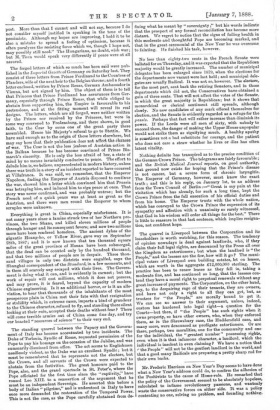The quarrel in Liverpool between the Corporation and its leaseholders
is worth watching, for this reason. The tendency of opinion nowadays is dead against landlords, who, if they claim their full legal rights, are denounced by the Press all over the Kingdom as extortioners ; but when the landlord is "the People," and the lessees are the few, how will it go ? The muni- cipal voters of Liverpool own building estates, let on leases, which are worth in the aggregate E12,000,000 sterling. The practice has been to renew leases as they fell in, taking a moderate fine, and has continued so long, that the lessees con- tend they they have a moral right to perpetual renewals without any great increase of payments. The Corporation, on the other hand, say, to the despairing rage of their tenants, they are owners, and have not only a right to all they can get, but, as trustees for "the People," are morally bound to get it. We can see no answer to their argument, unless, indeed, custom has hardened into legal right—a question for the Courts—but then, if "the People" has such rights when it owns property, so have other owners, who, when they enforced them, as in the Shrewsbury case, the Huddersfield case, and many more, were denounced as profligate extortioners. Or are there, perhaps, two moralities, one for the community and one for the individual, the "greatest number" possessing rights, even when it is that infamous character, a landlord, which the individual is insolent in even claiming ? We have a notion that
the People" will not be the gentlest landlord in the world, and that a good many Radicals are preparing a pretty sharp rod for their own backs.






















































 Previous page
Previous page